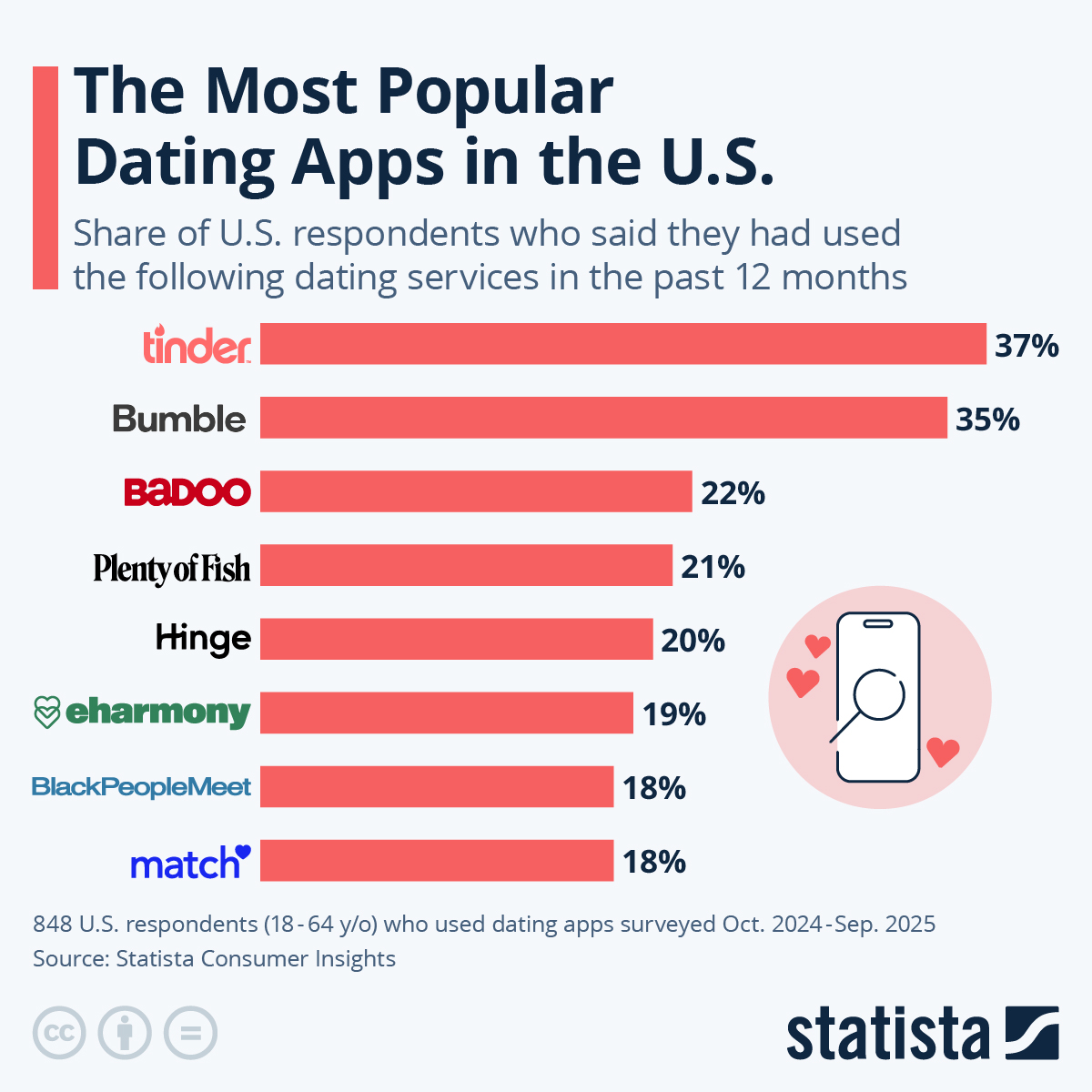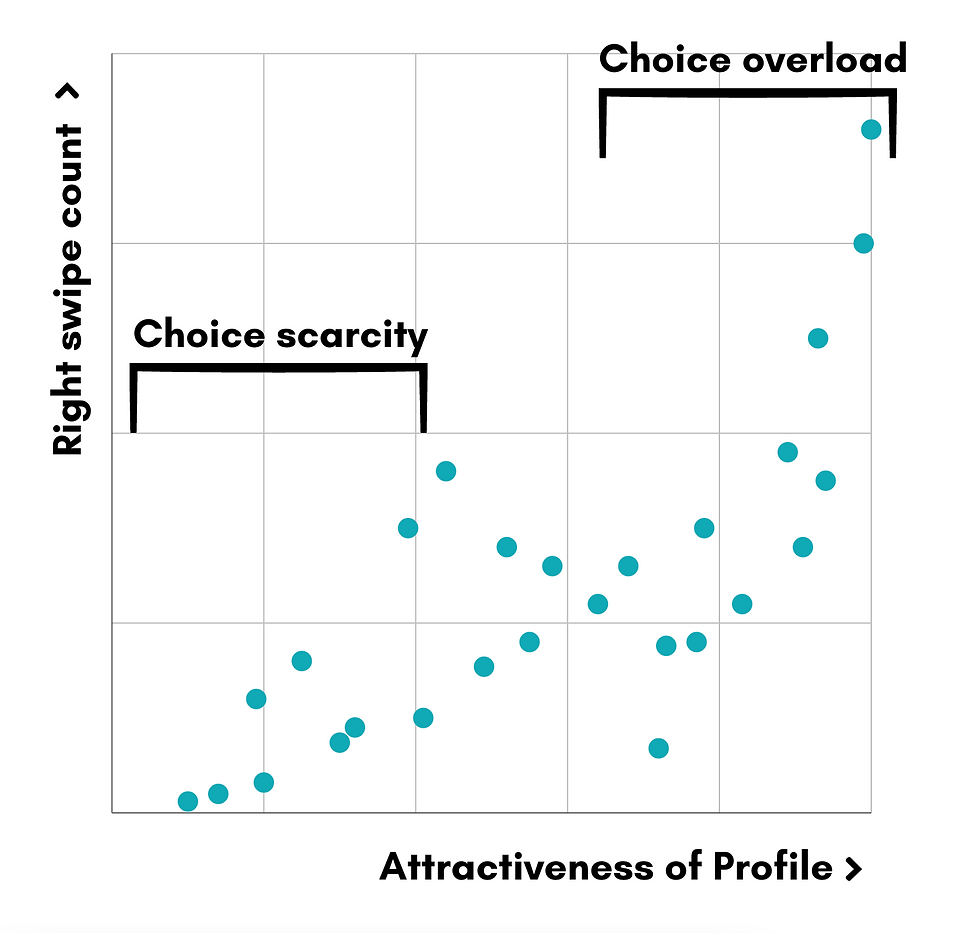Introduction
You open a dating app, and there are thousands of profiles just a swipe away. At first, the infinite options feel thrilling. But after dozens of conversations that fizzle out, you’re exhausted, disillusioned, and questioning your ability to connect. Welcome to the choice overload, supercharged by the swipe culture of modern dating.
While it’s never been easier to meet people, research suggests an abundance of romantic options can leave us less satisfied, less committed, and more anxious. Let’s unpack how endless choices impact our psychology and attachment styles.
Read More- Decision Overload
The Dating App Revolution
Apps like Tinder, Bumble, and Hinge transformed how people find partners. By 2023, nearly 30% of U.S. adults had used a dating app, and the average active user swiped over 150 times a day (Smith et al., 2022).

The dating app economy profits from keeping users engaged, more swipes, more matches, more microtransactions. But this “gamified” system can clash with how humans evolved to form emotional bonds.
Choice Overload 101
Psychologist Barry Schwartz popularized the idea of choice overload: when too many options lead to anxiety, regret, and dissatisfaction (Schwartz, 2004). In dating, seeing endless profiles can trick us into thinking there’s always a better match just one more swipe away.
A classic 2000 study by Iyengar & Lepper found people were more likely to make a purchase — and felt better about it, when choosing from 6 options instead of 24. In dating, the stakes are even higher: relationships, identity, and self-worth are on the line.
Attachment Anxiety Meets Infinite Options
Dating apps may be especially challenging for people with anxious attachment styles. A 2019 study found anxious individuals using swiping apps reported more emotional ups and downs, and felt more rejection sensitivity compared to securely attached users (Strubel & Petrie, 2019).

On the flip side, those with avoidant attachment can find infinite options a way to avoid emotional closeness altogether, hopping from match to match without committing.
“Grass Is Greener” Syndrome
When we’re always one swipe away from someone new, we develop what psychologists call counterfactual thinking, imagining how things could be better with someone else. This undermines commitment and deep connection.
A study by D’Angelo & Toma (2017) found that people exposed to profiles of “high-quality” potential partners rated their own partners as less attractive and were less satisfied in their relationships.
Decision Fatigue and Burnout
Decision fatigue sets in when repeated small decisions (like who to swipe on) drain mental energy. Apps present a seemingly endless series of small choices, which can lead to cognitive overload.

Users describe feeling burned out, cynical, and disillusioned. Even if a good match comes along, they may not have the mental or emotional bandwidth to engage meaningfully.
The Paradox of Choice in Love
Why don’t more options make us happier? Schwartz’s research suggests:
- More choices increase expectations; we start to believe a “perfect” partner exists.
- Even if we find someone great, we second-guess our decision.
- Regret over potential “missed” options can undermine satisfaction.
How to Use Dating Apps Without Losing Your Mind
- Limit your pool: Consciously set a time or match limit (e.g., 10 profiles per day).
- Prioritize depth over breadth: Focus on getting to know a few matches well rather than scattering attention.
- Reflect on patterns: Are you swiping for validation or meaningful connection?
- Take breaks: Digital detoxes can reset perspective and reduce burnout.
Can Apps Change the Game?
Some apps now prioritize slower, more mindful matching, like Coffee Meets Bagel’s limited daily picks. This approach mirrors research on bounded choice, where fewer options can increase satisfaction and commitment.
Conclusion
Dating apps have revolutionized romance but created an environment where choice overload can sabotage genuine connection. By understanding how infinite swipes affect our minds, we can set healthier boundaries and use technology to support — not undermine — lasting love.
References
D’Angelo, J. D., & Toma, C. L. (2017). There are plenty of fish in the sea: The effects of choice overload and reversibility on online daters’ satisfaction with romantic matches. Communication Research, 44(2), 313–337.
Iyengar, S. S., & Lepper, M. R. (2000). When choice is demotivating: Can one desire too much of a good thing? Journal of Personality and Social Psychology, 79(6), 995–1006.
Schwartz, B. (2004). The paradox of choice: Why more is less. HarperCollins.
Smith, A., Anderson, M., & Vogels, E. A. (2022). Online dating in the digital age. Pew Research Center.
Strubel, J., & Petrie, T. A. (2019). Love me tinder: Attachment style and swipe-based dating app use. Journal of Social and Personal Relationships, 36(9), 2664–2682.
Subscribe to PsychUniverse
Get the latest updates and insights.
Join 3,041 other subscribers!
Niwlikar, B. A. (2025, July 10). Choice Overload in Modern Dating and 4 Important Ways to Use Dating Apps Without Losing Your Mind. PsychUniverse. https://psychuniverse.com/choice-overload-in-modern-dating/




Pingback: Why Dating Apps Fail After 30: Luxy’s Guide to Quality Matches